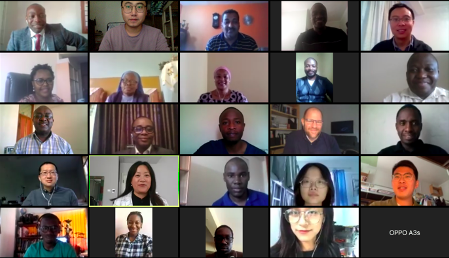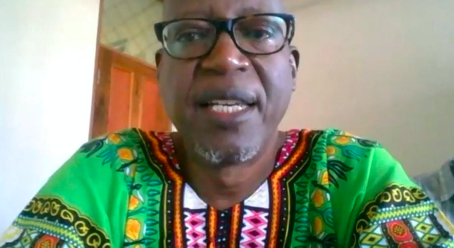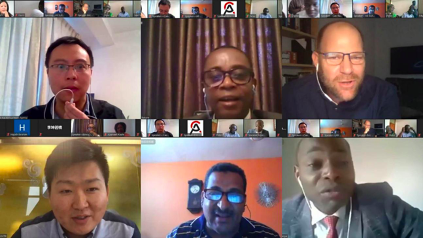In the wake of fake news in the digital age, the Institute of Community with Shared Future, Communication University of China, and St. Augustine University of Tanzania co-organized an online conference on October 14th, 2020. This conference brought about 63 professional journalists, researchers, scholarsand students.

Pic 1 conference held online
The pertinent issue in the discussion was Against fake news reporting China-Africa corporation agenda. In her opening remarks, Professor Zhang Yanqiu,Deputy Dean of the Institute for CommunitywithSharedFuture, is also the DirectorofAfricaCommunication Research Center at the Communication University of China stated the importance of such cooperation between different fields to share knowledge and discussions on the issue that affects China and Africa's corporation.

Pic 2 Speech from Prof.Pontian Ndabaneze
In his opening remarks, Professor Pontian Ndabaneze, the Deputy Vice-chancellor for academic affairs, the St. Augustine University of Tanzania. Alluded to the conference's importance when Africa and China have faced various challenges in facing fake news and misinformation in the various social media that has been triggered by high technology penetration. In his view, he said, Fake news is the biggest threat of the world currently, that impeded the communication of Shared Future of Mankind, hence need to fight it because it endangers, devalues and delegitimize expertise and outwrites the concept of valid data.The trend of fake news in China and Africa is seen as propagated by the lack of facts. In this view, the vice-chancellor pointed out that facts help fight against fake news and give reality about the world. He noted that Western media do not portray Africa positively, where Africa is always reported as a continent of war, hunger, and diseases. In his concluding observation, he urged African journalists not to repeat what western media are broadcasting. Therefore, they must make a fact check, correct, and confirm such reports before reporting such news. Lastly, he applauded the conference conveners by saying, This conference will bring effort in fighting fake news and misinformation. I appreciate the corporation between CUC, especially the Institute of Community with Shared Future, in co-hosting this exciting event.
On another note, Mr. Cao Kai, the Executive Deputy Editor-in-chief of Xinhua News Agency Africa Regional Bureau said that the corporation of china and Africa was booming despite the backlash from various African media, with Nigerian media being critical of China after the so-called racial discrimination incidents. He supported the fact that fake news, for example, was politically motivated in Kenya media, citing some 200 Chinese being flown back from Kenya amidst the pandemic in Kenya. In his view, the kindness showed by the Chinese is not recognized in African media. The media in Africa follow western media for their stories, which in most cases create troubles between China and Africa. It is right time to organizing such an event where we can learn and engage with one another on issues that are affecting us. Such more exchange of ideas that we have, we can be more meaningful when we address issues that are portrayed by others who lack the understanding of China's intention in Africa, said Mr. Cao Kai.

Pic 3 Topic Speeches
It is important to fact check for the news to be good news. While news used to be limited to a particular country, social media has come to act as a platform to propagate rumors spread over the continent. For instance, Mr. Eric Olander, Managing Editor of The China Africa Project, South Africa, contended that Chinese diplomats should come up transparent and address fake news issues targeted towards China. In his analysis, Eric suggests that issues like the debt trap in Africa are only based on political ignorance by people who are not educated on fake news. In such spread fake news, the Chinese fail to comment, which creates a vacuum of information and, in most cases generating perceptions from different quotas. He further praised China's former ambassador to South Africa for his openness and engagement whenever any issues negatively portrayed China's engagement in Africa. And advises that Chinese diplomats should emulate such kind of strategy, which currently is lacking. He also mentioned that fact-checking would be made much easier if both the Chinese and various African governments would make information more available and to be more transparent, particularly on issues related to loans and debt Mr. Eric Olander.
Journalists play a significant role in the sourcing and dissemination of news. They are the mirror to which the world can view itself. Various practitioners in this conference agreed that constructive journalism is more based on a solution. When such a concept is practiced well in Africa, it could minimize the trend and spread of fake news and misinformation, tarnishing the corporation between China and Africa. According to Mr. Lovering Sichizya, a Journalist and Researcher based in Zambia lamented that China and Africa's relation has been widely researched in academia and reported in the various media sphere. In his views, china has been portrayed with inferior quality products and a lot of misconception, negativity, and objective reporting. He further stated that Facebook is used to spread fake news concerning China, capturing some of the African country's heritage. He suggests that journalists most of the corporation between China and Africa are state-centric. He advocates for a more people-to-people corporation to learn and understand each other at the local level.
Regarding journalistic approaches, Mr. Shichizya mentioned, Western media have influenced how china Africa communicate. There are no stories from African contexts that make it possible for international media to demonize China's Africa relations. Journalists need to be educated and get new ways of communicating; they should offer solutions to the problems, employment of positive, engagement, meaning, and achievement.
On the same note, Mr.Idowu John Bakare, a Journalist, Communications Specialist, and Media Manager based in Nigeria, agreed to the sentiment brought forward by Mr.Shichizya. In his argument, he feels that the western media have influenced how the Nigerian journalist's report. In his judgment, he coins this to the orientation and geopolitics, which appears to be the heart of fake news. He states that Nigeria's Chinese engagement is not as before and whereby fake news, disinformation, and misinformation is not a new phenomenon in social media platforms. To him, he contended, Stakeholders should engage in timely and clear messages to the audience. They should come out to tackle the fake news because most people are challenged with the language.
Conferring to Mr. Shen Shiwei, the News Producer, Columnist, and Commentator of China Global Television Network (CGTN) based in China describe fake news or false information having particular interest. Such interest is politically motivated, which creates misunderstandings on culture, political, and economic development. The challenges associated with such kind of misinformation are verification and damage control. In his views, Mr. Shiwei agrees with other speakers that social media has made it easy and cheap to create and spread fake news. He cites that it is costly to fix the damage caused by the spread of fake news. He also claims that information overload in social media presents aspects of different media being easily shared and create a huge impact. He argues that Chinese diplomats are learning new social media like Facebook and Twitter. Regarding whether geopolitics propagate the spread of fake news about China and Africa relations, He viewed it as USA mission to curb China and Russia's presence in Africa. He advocates for more constructive and investigative journalism while reporting issues of China and Africa to avoid misinformation.
In his presentation, Mr. Ali N. Sultan, a renowned journalist from Tanzania, based his argument on the new trends, technology advancement that has propagated fake news. Such has eroded the trust of leaders and organizations and eliminated journalism's truth, creating a community of division. China has been put on light because of the perception and explicitly biases without verification of information. According to Mr. Sultan, fake news is used as a weapon against others to distort the process, leading to a loss of taste of listening while journalists are not reporting about china. This has limited the Chinese news from the African perspective, where Chinese products dominate the market, creating jealousness ideology by individuals. For him, engaging with the citizens enable the diffusion of misinformation hence making good decision and journalist to practice evidence journalism to avoid the spread of fake news.
From the question and answers, facilitated by Peter Mataba Lecturer, Editor & Consultant Trainer, some of the audience indicated;Greater impact can be made from transparency communication and mind in our thought that the impact of people's perception comes from the different environment, but it's through media that people can show what it is going on in their thought so on my view China should examine every aspect which relates them with Africa and making sure every aspect is well monitored and if there is any occurrence which needed explanation they should act fast and effectively by providing clear information with evidence also they should make use of public relations department to change citizen ideologies and perception (Veronica Masubo).
Others said, Currently the mainstream media sometimes rely on social media as news sources… the advantage that social media has over the mainstream is spontaneous and easy accessibility. Credibility is when the same news item is re carried in mainstream media… now if we intend to combat fake and false items, we have to design a mechanism to starve the online sources unless checked and approved (Beatrice Ng'walida)
In his closing remarks, Mr. Mark Mmbando, Dean of social sciences, St. Augustine University of Tanzania, confirmed that the conference was very successful. He pointed out that there were fake news and real news, political involvement, economic factors in all aspect. He urged that information must be analyzed before it is disseminated. He also confirmed that China and Africa's relationship is still growing every day, which is mutual and needs to be promoted.
Professor Zhang Yanqiu thanked the panelists and the participants and informed them that such conferences will be organized in the future to create a community of shared future and knowledge with different parts of the world.
REPORTED BY: Daniel Oloo
